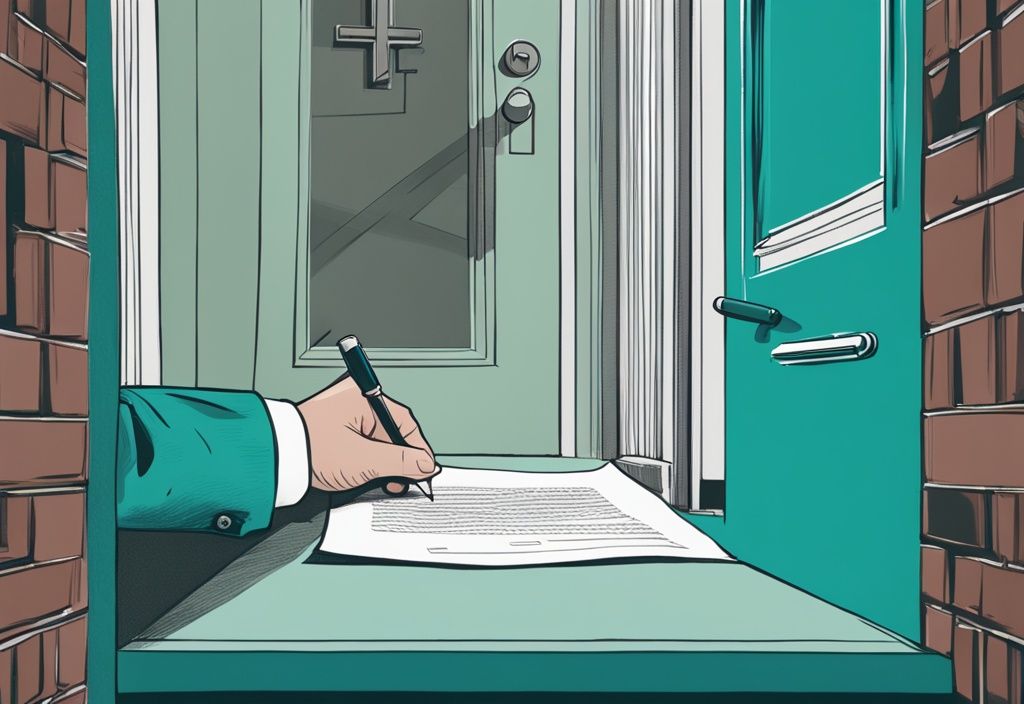
Have you ever wondered what can protect you in a real estate deal with hundreds of thousands—even millions—at stake? Ever heard of the escape clause? Exactly, your lifeline in complex property deals. With this little-known but powerful tool, you can navigate the fluctuating real estate market with greater confidence and more strategic flexibility.
In this article, we’ll be blowing the lid off the escape clause in real estate – exactly what it is, its strategic advantages, and how it works to secure your interests in property transactions. Be it buying or selling, understanding this provision can drastically affect your next real estate endeavor or ensure your exit without a scratch if things go south.
Let’s delve deeper to see how an escape clause can be your key to ‘escape’ stressful real estate transactions and emerge triumphant. Remember, knowledge is power, especially amid the chaos of real estate deals. Stick with me—you won’t regret it!
What is an Escape Clause in Real Estate?
An escape clause in real estate is a strategic provision embedded in a property contract. It grants either the buyer or the seller the right to back out of the agreement under specific conditions without facing penalties. This clause is designed to protect both parties if certain contingencies aren’t met, providing an exit strategy to avoid unfavorable situations.
Imagine you’re a buyer concerned about securing financing or worried a home inspection might reveal significant issues. An escape clause can be your safety net. It allows you to withdraw from the deal without losing your deposit if these concerns materialize. On the flip side, as a seller, you might prefer to keep your options open. An escape clause enables you to entertain potentially better offers even while under a conditional agreement, giving you flexibility in a fluctuating market.
Escape clauses shine in volatile market conditions. Buyers benefit from the peace of mind that comes with knowing their purchase is contingent on meeting specific criteria, like obtaining financing or a favorable home inspection. Sellers, meanwhile, enjoy the freedom to engage with conditional offers without being indefinitely tied down, allowing them to pursue superior offers proactively.
Overall, escape clauses in real estate serve a critical role. They cushion both buyers and sellers against unforeseen issues, ensuring everyone has the legal protection and flexibility needed to navigate complex property transactions smoothly. By providing a structured exit plan, they help facilitate dispute-free real estate dealings.
Why Use an Escape Clause in Real Estate Deals?
An escape clause in real estate can provide significant advantages for both buyers and sellers, serving as a safety net in various situations.
Advantages for Buyers
One major benefit of an escape clause in real estate deals is the protection it provides if financing falls through. Despite their best efforts, buyers might face unexpected issues securing a loan. In such cases, an escape clause allows them to withdraw from the deal without facing legal or financial penalties. This ensures they don’t find themselves in a tricky financial situation.
Imagine you’re buying a house, and the home inspection reveals major problems, such as foundational issues or a leaky roof. Thanks to an escape clause, you can walk away from the agreement, avoiding the need to invest in costly repairs. Appraisal contingencies within the escape clause also serve buyers well. If the property’s appraised value is less than the purchase price, the clause enables you to back out, ensuring you don’t overpay.
An escape clause can also include a Sale of Property (SOP) condition, which is a lifesaver if you need to sell your current home before buying a new one. This condition ensures you only move forward with the purchase if your existing home sells within a specified period. This prevents the financial strain of managing two mortgages at once.
Advantages for Sellers
For sellers, an escape clause in real estate contracts can be a game-changer. It allows sellers to accept conditional offers while still exploring potentially better deals. You won’t be locked into one deal, enabling you to seek out buyers who might offer more attractive terms or higher bids.
Avoiding frustration is another key benefit. If the buyer fails to secure financing or meet other contingencies, you can use the escape clause to exit the agreement and search for more reliable offers. This is crucial to prevent wasting valuable time and missing out on other opportunities.
Moreover, if a better offer comes along, sellers usually have a structured timeframe—typically 24-48 hours—for the initial buyer to remove their contingencies. This creates a sense of urgency, encouraging quicker decisions. In the meantime, you can continue marketing your property, maximizing its exposure and boosting the chances of receiving offers that meet your expectations.
Common Types of Escape Clauses and How They Work
Escape clauses in real estate contracts are essential tools that help manage risks and protect both buyers and sellers. Let’s explore some common types of escape clauses and understand their significance in real estate transactions.
Financing Contingencies
Financing contingencies are a lifesaver for buyers. Imagine you’ve found your dream home but can’t secure the necessary funds due to a failed mortgage application. This clause steps in, allowing you to exit the contract without penalty if you can’t obtain financing by a specified date. It serves as a safety net, ensuring you’re not stuck in a deal that could lead to financial strain or legal troubles.
Inspection Contingencies
Inspection contingencies provide a vital layer of protection by letting buyers back out if a home inspection reveals significant issues. During a designated period, you can get the property inspected. Should the inspection uncover substantial defects or necessary repairs that can’t be resolved to your satisfaction, you have the right to walk away from the deal. This clause is crucial for safeguarding against unexpected and expensive repairs, giving you peace of mind.

Appraisal Contingencies
With appraisal contingencies, you’re protected from overpaying for a property. If the property’s appraised value comes in lower than the agreed purchase price, this clause allows you to cancel the deal. It ensures that what you pay reflects the property’s true market value, which is particularly important if you’re using a mortgage. Lenders won’t approve loans higher than the property’s appraised value, making this contingency vital for financial stability.
How Conditional Offers Work
Conditional offers in real estate come with specific requirements that need to be met before a sale is final. These often include securing financing, completing a property inspection, or selling the buyer’s current home. If these conditions aren’t met within an agreed timeframe, either party can exit the agreement without facing penalties. This structure helps manage uncertainties and sets clear expectations for both buyers and sellers, making the transaction smoother.
Typical Timeframes for Escape Clauses
Timeframes are crucial for the effectiveness of escape clauses. For immediate contingencies, standard response times usually range from 24 to 48 hours. Longer conditions, like the Sale of Property (SOP) condition, often have timeframes around 30 days or more. These periods are designed to give both parties enough time to meet the contingencies or exercise their rights to withdraw, promoting a fair and balanced negotiation environment.
Practical Examples of Escape Clauses in Real Estate
Escape clauses can be a game-changer in real estate negotiations, offering both buyers and sellers a safety net during the transaction process. Let’s dive into two widely used escape clauses: the Sale of Property (SOP) condition and the 72-hour clause.
Sale of Property (SOP) Condition
The Sale of Property (SOP) condition is a strategic escape clause designed to protect buyers who need to sell their current home before purchasing a new one. Have you ever worried about juggling two mortgages if your existing home doesn’t sell in time? The SOP clause is your solution. It gives you a set timeframe—often around 30 days—to successfully sell your home. Denk mal darüber nach, within this window, if your home doesn’t sell, you can back out of the deal without penalties. This ensures you aren’t left financially stretched, making the home-buying process less stressful.
The 72-Hour Clause
Now, let’s talk about the 72-hour clause, one of the most flexible escape clauses for sellers. Imagine you’ve accepted an initial conditional offer but still want to keep your options open. This clause allows you to continue marketing your property. If another, better offer comes in, the initial buyer has 72 hours to either fulfill all contingencies or step back from the agreement. This not only keeps you competitive but also prevents you from missing out on superior offers. Ganz ehrlich, it’s a win-win, giving you the freedom to pivot if a more lucrative deal arises.
Risks Involved and Legal Safeguards for Using Escape Clauses
When dealing with escape clauses in real estate, understanding the risks and legal safeguards is crucial. Below, we explore the vital roles of professional legal representation and real estate agents in navigating these complexities.
Role of Professional Legal Representation
An escape clause in real estate can be a minefield of legal intricacies. That’s why having a professional by your side is non-negotiable. Think of attorneys as your personal guides through the contractual jungle. They highlight your rights and responsibilities, decode the fine print, and ensure you fully grasp the consequences.
Imagine buying a house only to find out later that the escape clause wasn’t clear—nightmarish, right? Legal professionals step in to meticulously review the terms, making sure everything is clear and enforceable. This vigilance can avert disputes and hidden traps.
Plus, consulting an attorney brings peace of mind. It means that every nuance of the escape clause is understood and agreed upon. This essential step ensures your interests are protected, letting you sleep easier at night.
Role of Real Estate Agents in Implementing Escape Clauses
Ever wonder who else plays a starring role in the successful use of an escape clause in real estate? Enter the real estate agent. With their wealth of experience, agents craft and negotiate escape clauses that align with your best interests.
Expert agents don’t just write these clauses—they navigate the maze of contingencies, ensuring everything is clearly laid out and agreed upon. Their keen eye for detail helps avoid misunderstandings, saving you from future headaches.

Real estate agents outline all necessary conditions and timeframes, providing a clear roadmap. This proactive approach facilitates smoother transactions and keeps potential disputes at bay. Trust me, having a skilled agent on your side makes all the difference.
Myths and Misconceptions about Escape Clauses
Debunking the Myth of Automatic Bumping of First Offer
One common misconception in real estate transactions is the belief that a second offer automatically replaces the first one when it includes an escape clause. However, this isn’t the case. The initial offer must be given an opportunity to satisfy all the conditions in the contract within the specified timeframe, usually 24-48 hours, before it can be bumped.
This process ensures fairness. It allows the initial buyer to secure their position by meeting the criteria set forth in the original agreement. The escape clause in real estate creates a balance, providing a chance for new offers while protecting the first offer’s interests.
Can Specific Conditions be Removed Under an Escape Clause?
Another widespread misconception is that buyers can selectively remove conditions under an escape clause. But the reality is different. When an escape notice is issued, the first offer must remove all conditions to maintain the contract.
This rule ensures that the buyer is fully committed to the purchase and can’t leave any ‘escape routes’ open by only addressing select conditions. By enforcing the removal of all conditions, the process fosters an environment of commitment and clarity. Both parties become equally invested in the contract’s terms.
In essence, the escape clause in real estate acts as a safeguard. It’s designed to ensure genuine intent to proceed with the transaction, eliminating the possibility of partial fulfillment of conditions.
Strategic Use of Escape Clauses in Real Estate
Escape clauses in real estate contracts are vital tools that can empower both sellers and buyers. Through strategic use, they can provide flexibility, control, and protection, ensuring more favorable outcomes for all parties involved.
How Sellers Can Benefit Strategically
Escape clauses offer sellers a tactical advantage by helping them maintain control and flexibility during a real estate transaction. Imagine this: you have a buyer lined up, but they can’t meet certain conditions in a timely manner. Instead of being stuck waiting, an escape clause allows you to move on. This makes sure your property isn’t off the market for too long, avoiding lengthy uncertainty.
Plus, these clauses give sellers significant leverage. If you’re presented with a better offer, the escape clause can push the original buyer to either meet conditions quickly or step aside. This not only speeds up the transaction but keeps your property actively marketed, upping your chances of getting a more lucrative deal.
The strategic use of escape clauses ensures you remain flexible. They keep you from being locked into unfavorable agreements and allow you to seize better opportunities when they arise.
Optimal Ways for Buyers to Use Escape Clauses
For buyers, escape clauses are essential for managing risks. They protect against financial uncertainties, especially when it comes to securing financing. If you can’t obtain a loan by the agreed date, an escape clause allows you to back out without penalties. This way, you’re safeguarded from financial strain.
Escape clauses also come in handy during the home inspection process. Imagine finding significant defects or costly repair needs. Thanks to the escape clause, you can exit the agreement if the property doesn’t meet your standards or budget.
Additionally, appraisal contingencies within escape clauses prevent overpaying. If an appraisal doesn’t support the purchase price, the clause offers an exit route. This ensures you’re only proceeding with deals that reflect true market value.
Ultimately, using escape clauses wisely allows buyers to pursue attractive properties while maintaining a strong safety net. This makes sure you’re making informed and secure investments, free from unexpected financial risks and problems.

Conclusion
Escape clauses are integral components of real estate transactions that provide significant protection and flexibility for both buyers and sellers. These clauses facilitate a structured approach to managing unexpected issues, ensuring that all parties involved have the opportunity to withdraw from the agreement without facing penalties if specific conditions are not met.
For instance, buyers benefit from escape clauses by securing the option to exit a deal if they fail to obtain financing, discover major issues during a home inspection, or find that the property’s appraisal does not meet the purchase price.
Sellers, on the other hand, leverage escape clauses to keep their property on the market while a conditional offer is in place. This strategy allows them to entertain potentially better offers, thus avoiding prolonged commitment to a deal that may not close. Sellers particularly benefit from clauses like the 72-hour clause, which grants them the ability to continue seeking offers and press initial buyers to fulfill contingencies promptly or risk losing the property.
However, the effective implementation of escape clauses necessitates professional guidance. Legal counsel is essential to understand rights and obligations fully, ensuring that contract terms are clear and enforceable. Legal professionals can provide critical advice on the potential consequences and navigate the intricacies of these provisions.
Similarly, the role of experienced real estate agents cannot be overstressed. Agents play a crucial part in negotiating and drafting escape clauses. They are responsible for ensuring that all contingencies and timeframes are clearly communicated and understood by all parties, aiding in preventing misunderstandings and potential disputes.
In essence, escape clauses serve as a safeguard in real estate transactions, offering an exit strategy under predefined conditions. The proper use of these clauses can significantly enhance the smoothness and predictability of real estate transactions, protecting the interests of both buyers and sellers. Enlisting the expertise of legal professionals and seasoned real estate agents is highly recommended for anyone navigating the complexities of escape clauses in real estate.
Quick Answers to Your Questions about Escape Clauses
An escape clause can be a vital element of real estate contracts, offering flexibility and protection for both buyers and sellers. Let’s dive into some common questions about this crucial component.
What Exactly is an Escape Clause in Real Estate?
An escape clause is a provision within a real estate contract that allows one or both parties to withdraw from the agreement under specified conditions. This could be due to various reasons, such as financing issues, inspection results, or other contingencies not being met.
Think of it as a safety net. If something goes awry, the clause provides an exit strategy, offering peace of mind in potentially unpredictable situations.
How Can an Escape Clause Edify a Seller’s Position?
An escape clause enhances a seller’s position by allowing them to continue marketing the property and consider better offers while providing a designated timeframe for the initial buyer to meet all contingencies. This ensures the seller is not immobilized by any single conditional offer.
Imagine you’re a seller in a hot market. You don’t want to miss out on better offers just because a potential buyer is dragging their feet. An escape clause helps keep your options open.
Are Escape Clauses Universally Present in Real Estate Deals?
No, escape clauses are not universally present in all real estate deals. Their inclusion depends on negotiations between buyers and sellers and is influenced by specific market conditions. In some agreements, escape clauses may be deemed unnecessary or unfavorable.
It’s all about the context. For instance, in a seller’s market, buyers might steer clear of escape clauses to make their offers more attractive.
Expected Timeframe for an Escape Clause: What to Anticipate?
The typical response period for an escape clause in real estate is 24-48 hours for immediate decisions. Broader conditions, such as the sale of property, often come with longer timeframes, typically around 30 days, providing parties ample time to meet stipulations.
Consider how quickly decisions need to be made. Immediate contingencies often require fast turnarounds, while more complex conditions require longer periods to sort out.
Can a Buyer Choose to Forego Including an Escape Clause?
Yes, a buyer can choose to forego including an escape clause in their offer to make it more attractive, particularly in competitive markets. Forgoing an escape clause can signal greater commitment to the purchase, appealing to sellers looking for a secure transaction.
Think about it from the seller’s perspective. A buyer without an escape clause often seems more committed, giving the seller reassurance of a more certain close.
These insights should help demystify the concept of escape clauses in real estate. They’re not always necessary, but understanding their role can protect your interests and give you greater confidence in any transaction.






